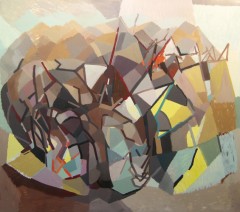Editorials Matthew Dickman — April 18, 2013 10:54 — 0 Comments
Six Questions For Matthew Dickman
Matthew Dickman is the poetry editor of Tin House Magazine. He also authored two chapbooks, Amigos and Something about a Black Scarf, and two full-length poetry collections. His first book, All-American Poem, won the 2008 American Poetry Review/Honickman First Book Prize in Poetry, published by American Poetry Review. He spoke with us in March.
–Jake Uitti, The Monarch Review
1) You said in an interview for Willow Springs with Tim Greenup, “I think empathy is one of the greatest things besides love.†How do you think you arrived at this resolution?
Maybe we need empathy to engage in love. Or else it’s a which came first thing. I think I arrived at the idea…no it’s not an idea but a need! I arrived at the need for community like any other human being. Without community, without someone else reflecting back your own shared reality (though everyone experiences it in a different shade) then aren’t we lost? I don’t want to be lost. Not like that. I like to feel lost sometimes but only because I have faith that I will be found.
2) In what way do you like to feel, or accept the idea of feeling, lost? Have you ever felt a sense of place?
I believe that there is a great amount of creative energy in feeling lost, in losing, in streets you don’t know, in dark forests. Maybe accepting that you are lost is a step closer to knowing the Self. It’s an acute type of intimacy. And maybe not! I have always felt a sense of place in bookstores and in looking at puddles, especially puddles in the springtime. Both are great comforts. And also in the voices of my siblings, alive and dead, there has always been a home for me inside the sounds they make!
3) How does your work with Tin House affect your life outside of the office creatively?
At Tin House I get to read a lot of amazing writing. And experiencing good art always affects your life. So perhaps I live a more interesting life because of it, a life where trees are more than trees, where because of reading the hearts of others my heart is more open.
4) At one point you were working at Whole Foods, what about the food service industry did you find helpful, did you find terrible?
There was a lot about working at Whole Foods I loved. Great insurance, working with people I really adored. But often customers could be pretty rude, could make you wonder how on earth we ever invented the wheel or learned to build rockets. I didn’t like that part. Feeling low about being a human because of mistreatment. Anyone who works in the Service Industry knows that feeling. But I liked having a solid job I could clock in and out of. I never had to take my work home, which was nice. And not worrying about rent helps the creative process!
5) The sound of your work is often talky. One gets the sense one might, or should, hear this sort of story-telling beside someone at a bar. What about this style do you find inspiring?
For a long time my poems, the tone of them, were highly composed. As if to speak in a poem I felt I had to wear a stiff suit and fourteen ties. Eventually I felt constricted. What a shock! I wanted to be in my jeans and t-shirt! So I started writing more toward a way I imagined I sounded like when I was just talking. It feels free to me, even if it’s a kind of poetic failure, and freedom is always inspiring.
6) In the Greenup interview you said, “I don’t think any acting troupe rehearses a play to not put it on stage.†You also said, in regards to being published by American Poetry Review, “I was fucking stoked, like American Poetry Review, which is huge…†What do the “stage†and “huge†mean for you?
What I meant about “the stage” is that I believe part of our craft is to share the work we make with others, to attempt to at any rate…maybe the seats don’t get filled but if just one person hears you then you are affecting thousands of people, then you are engaging in the transfer and exchange of empathy. With APR I meant that I had been reading the review for years and it was an honor to be published in it…it was huge, that honor, for me.
The answer isn't poetry, but rather language
- Richard Kenney



